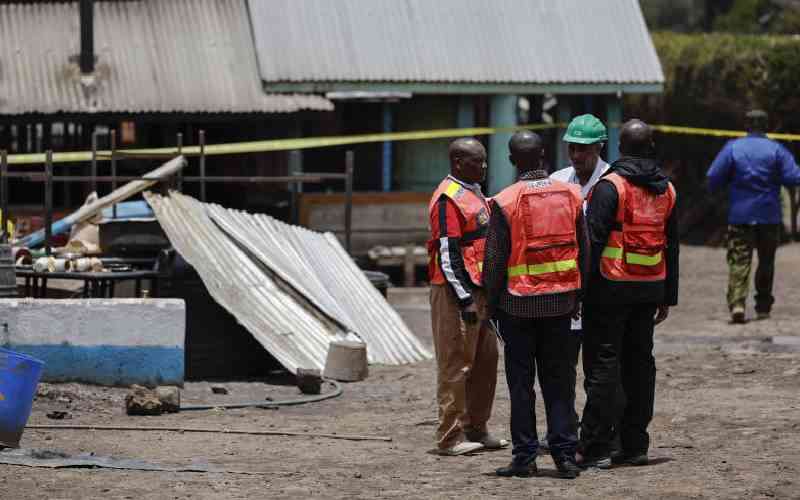For the longest time, Kisii town has been in the shadow of its Nyanza and Rift Valley neighbours.
Despite being a key commercial hub in South Nyanza, the town has not modernised at the same rate as Kisumu and Eldoret.
This is chiefly on the back of constraints inland and a dilapidated road network. The tide is, however, slowly but surely turning.
“The accelerated growth of the town started after the election-related tensions in 2008 when many Kisii people who were displaced elsewhere came home to settle there,” says Rael Otundo, a land economist in Kisii town.
Besides that, agriculture and the good climate in Kisii have enticed people from to scramble for space in town. It rains in the region almost throughout the year, thus boosting agricultural produce, which is sold relatively cheaply in the town.
Somewhat affordable
That makes Kisii somewhat affordable to stay in as food supply is almost guaranteed.
In addition, the town serves people from neighbouring counties, including Nyamira, Migori, Narok and Bomet, most of which rely on Kisii’s Daraja Mbili market for food.
There are also banking services that neighbouring towns lack. For instance, the Central Bank of Kenya has set up a clearinghouse in Kisii, thus elevating its importance.
However, as people stream in to stay and to do business, the land is diminishing fast in the densely populated region.
This had driven up prices and given mischievous middlemen an opportunity to con unsuspecting land buyers.
“Currently in Kisii Municipality, a 50 by 100 feet plot goes for between Sh40 million and Sh70 million,” says Ms Otundo.
“Even with the steep prices, demand is still high. This has opened a channel for theft and land fraud. People are so bold that they can make fake title deeds and sell somebody’s land without care.”
Some fraudsters collude with some officers in the land registry to abet the crime, she adds.
Dennis Nyatundo, a lawyer in Kisii town, says he has dealt with such cases. “Land grabbing has become so rampant within Kisii town. Most people who engage in this vice are land brokers who prey on naïve buyers,” he told The Standard.
Stay informed. Subscribe to our newsletter
“Unfortunately, court cases involving land take too long, sometimes up to five years.”
Vincent Sagwe, the county executive for Land and Urban Planning, admits that land fraud cases have become common in Kisii due to demand. “Land fraud is common in any place where demand for land is high and Kisii is not an exception,” he says, adding: “In fact, I have a case in one of the markets in town, where a piece of land is being claimed by four people. They all have title deeds for it.”
He says the county government has set up a multi-agency land committee to mitigate such cases. Various departments, including from the Ministry of Land and the national survey, are represented in the committee.
“That even makes it hard for one to even collude with the government official in making fake title deeds since it's going to be impossible to bribe all these officials from different departments,” says Mr Sagwe.
Ease transport
In addition, the official says, the county government is working to encourage investors to choose Kisii town.
“The county has upgraded the roads in the municipality. Besides, we are building new roads to open up other places and ease transport within the town,” he says.
“For example, soon we are launching a new road from Kisii downtown to Nyanchwa because it’s the fastest-growing peri-urban area of Kisii, with over 35,000 residents. Ogembo town is equally growing fast and very soon it will become a municipality.”
The matatu termini are also overwhelmed by the huge flow of vehicles, even after a new stage was set up.
“We realised that traffic is also increasing in town and the bus stages are not adequate any more. We are planning to set up another stage that will serve vehicles from Kilgoris and Nyamira. We have acquired the land and soon the process of building the stages will start,” Sagwe told Home & Away.
As if the town dwellers foresaw the land for expansion problem, the provision of rental houses seems to have been catered for in time. Tall buildings with clothes hanging on balconies and rooftops punctuate the town’s skyline.
“Even though there is a demand for rental houses, it is not as high as it was about two years ago, because people have built so many housing units,” says Otundo.
“What remains a problem is getting a house to buy, because most Kisiis don’t like buying ready-made houses. That is the culture of the people here, apparently.”
Kisii town has also been boosted by the high population of students in various universities and colleges in town. Many houses in Mwembe area are occupied by students.
Isaiah Keros is a caretaker at a rental apartment in the town. “Most of our tenants are university students,” he says, adding: “We realised that Kisii University, in particular, admits a lot of students every year and there would be definitely a need for rental houses.”
“This year alone the university received more than 5,000 freshmen. Obviously, the university hostels cannot accommodate that number of students and that is where we chip in to fill the gap,” Keros says.
Kevin Mbotela, a caretaker of another rental block, says they charge the students Sh12,000 per semester.
“There are other tenants, only that most houses are occupied by students,” he says.
A spot check confirmed Mbotela’s claim that most housing units in the town’s central business district were occupied by students. Most working residents live far from town in estates such as Nyanchwa, Suneka, Jogoo, Nyamataro and Gesonso.
Proper channels
As the town expands its frontiers and attracts real estate developers, Sagwe has a piece of advice for potential investors.
“Before you buy property, especially land, make sure you follow the proper channels, lest you be conned. Involve lawyers and seek to know the authenticity of the land from the Ministry of Lands and avoid brokers like a plague,” he says.
“We are planning to carry out sensitisation programmes in town and the county at large about the proper ways of getting and disposing of property,” he concludes.
 The Standard Group Plc is a
multi-media organization with investments in media platforms spanning newspaper
print operations, television, radio broadcasting, digital and online services. The
Standard Group is recognized as a leading multi-media house in Kenya with a key
influence in matters of national and international interest.
The Standard Group Plc is a
multi-media organization with investments in media platforms spanning newspaper
print operations, television, radio broadcasting, digital and online services. The
Standard Group is recognized as a leading multi-media house in Kenya with a key
influence in matters of national and international interest.
 The Standard Group Plc is a
multi-media organization with investments in media platforms spanning newspaper
print operations, television, radio broadcasting, digital and online services. The
Standard Group is recognized as a leading multi-media house in Kenya with a key
influence in matters of national and international interest.
The Standard Group Plc is a
multi-media organization with investments in media platforms spanning newspaper
print operations, television, radio broadcasting, digital and online services. The
Standard Group is recognized as a leading multi-media house in Kenya with a key
influence in matters of national and international interest.









